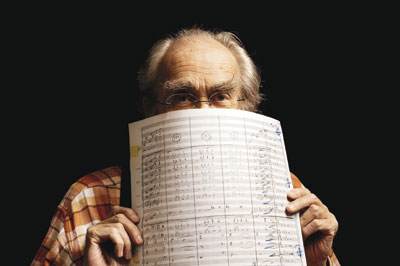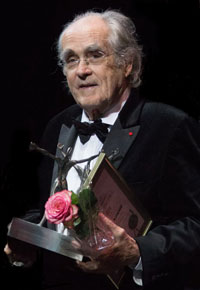Michel
Legrand

Benois de la Danse laureate
As a young man Michel Legrand also quenched his thirst at a musical spring which turned out to be decisive: jazz. The timing of this great discovery after the war was perfect: it coincided with the arrival of bebop. After being deprived of American culture for four years, the young Michel realized that music had another face, another language; it was a kind of alternative to the classical lessons of the Conservatoire.
In 1947 he went to see two concerts which Dizzy Gillespie gave at the Salle Playel, one after the other, and he was groggy when he came out. That was the day, he emphasizes, when jazz shot into my life. That period was an apprenticeship, a personal revolution… Ten years later in America, to thank me for I love Paris, Columbia gave me carte blanche to record the jazz album of my dreams. I jumped at the chance and brought in John Coltrane, Bill Evans, Phil Woods, Ben Webster… and Miles Davis, who was King of New York then. That album Legrand jazz is a legend, a foundation that sealed the Legrand/Davis relationship.
Legrand is a prolific composer, having written over 200 film and television scores in addition to many memorable songs. He is best known for his often haunting film music and scores, such as The Umbrellas of Cherbourg (1964) and The Thomas Crown Affair (1968) featuring the song The Windmills of Your Mind for which he won his first Academy Award. Michel Legrand tackled a new form of expression, film music, with Les Amants du Tage directed by Henri Verneuil in 1955. Four years later he became one of the artisans of the renaissance which was taking place in French films, working with Jean-Luc Godard, Agnès Varda, François Reichenbach and, of course, Jacques Demy, his brother in creation, with whom he invented a new form of film-musical: The Umbrellas of Cherbourg won the Palme d'Or at the 1964 Cannes Film Festival and also the Prix Louis Delluc before becoming a worldwide sensation. Also he has won three Oscars (out of 13 nominations) and five Grammys and has been nominated for an Emmy.
Classical music is a domain in which Michel Legrand has encountered a galaxy of stars in the course of a career filled with television programmes and recording-projects: Ivry Gitlis, Kiri Te Kanawa, Jean-Pierre Rampal, Alexandre Lagoya, Jessye Norman, Maurice André… For Michel Legrand, 2011 has been a year of schizophrenia, devoted simultaneously to composing the music for his first ballet Liliom for the Hamburg Opera, and to writing arrangements for an original Christmas record which cements his encounters with a new generation of singers.
Gallery

